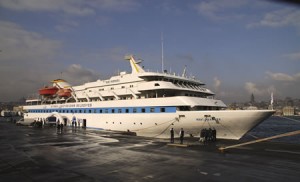Dies beschreibt der Economist in seiner aktuellen Ausgabe. Es gibt keine schwere humanitäre Katastrophe in Gaza, wie ja auch die Verteidiger der isarelischen Position immer wieder betonen. Aber vielleicht ist das gar keine gute Nachricht, wie der Economist zeigt: Denn das kommt daher, dass die Hamas eine Kriegsökonomie aufgebaut hat, die es ihr erlaubt, totale Kontrolle über den Streifen auszuüben. Es scheint, als würde die Sanktionspolitik die Islamisten fest im Sattel halten:
The policy began within weeks of Israel’s pull-out from Gaza in 2005. At the start, America tried to keep the gates open, brokering an Agreement on Movement and Access with Israel to allow the export from Gaza of hundreds of trucks of produce a day, regular bus convoys to and from the West Bank and the opening of a Palestinian-controlled crossing at Rafah to Egypt. But the agreement was in ink only. After just one year Gaza’s exports stood at a mere 8% of the agreed amount, Rafah was closed and the buses never came. Once the strip was under Hamas’s total control, Israel declared it a hostile entity, and prevented movement to and from the territory.
Initially Hamas and other militant groups, drunk on their self-claimed success in forcing Israel’s departure, sought to fight their way out with projectiles. The number of mostly home-made rockets hitting Israel rose from 281 in 2004 to 1,750 in 2008; and their range rose from a few kilometres to reach Tel Aviv’s outskirts. But stung by the ferocity of Israel’s reprisals, most lethally in the January 2009 war, Hamas reined in its fire and forced others to do likewise. So far this year 34 rockets have landed in Israel, none launched by Hamas. “Hamas is defending Israel,” chuckles an Israeli foreign ministry official.
Instead Hamas has turned its energies inward. With Gazans locked inside the 40km by 10km (154 square-mile) strip, the siege has given Hamas a free hand to mould the place. Its leaders liken Gaza to a ribat, a warrior monastery, and its inmates to murabitoun, or militant monks, recalling the 11th-century revivalist movement which withdrew to the Moroccan highlands before sweeping onto the Moroccan plains and Andalusia. They regale the struggle to survive with the same terminology they once used for fighting Israel. To ensure supplies they created a “resistance” economy, supervising the digging of an elaborate web of tunnels snaking under Gaza’s border with Egypt.
At first the resistance economy failed to meet people’s needs. But today, thanks to the tunnels, Gaza’s shop shelves are brimming with goods that often arrive cheaper and faster than when Israel opened the gates. Winches hoist in aggregates, allowing a spate of road repairs and housing construction….


